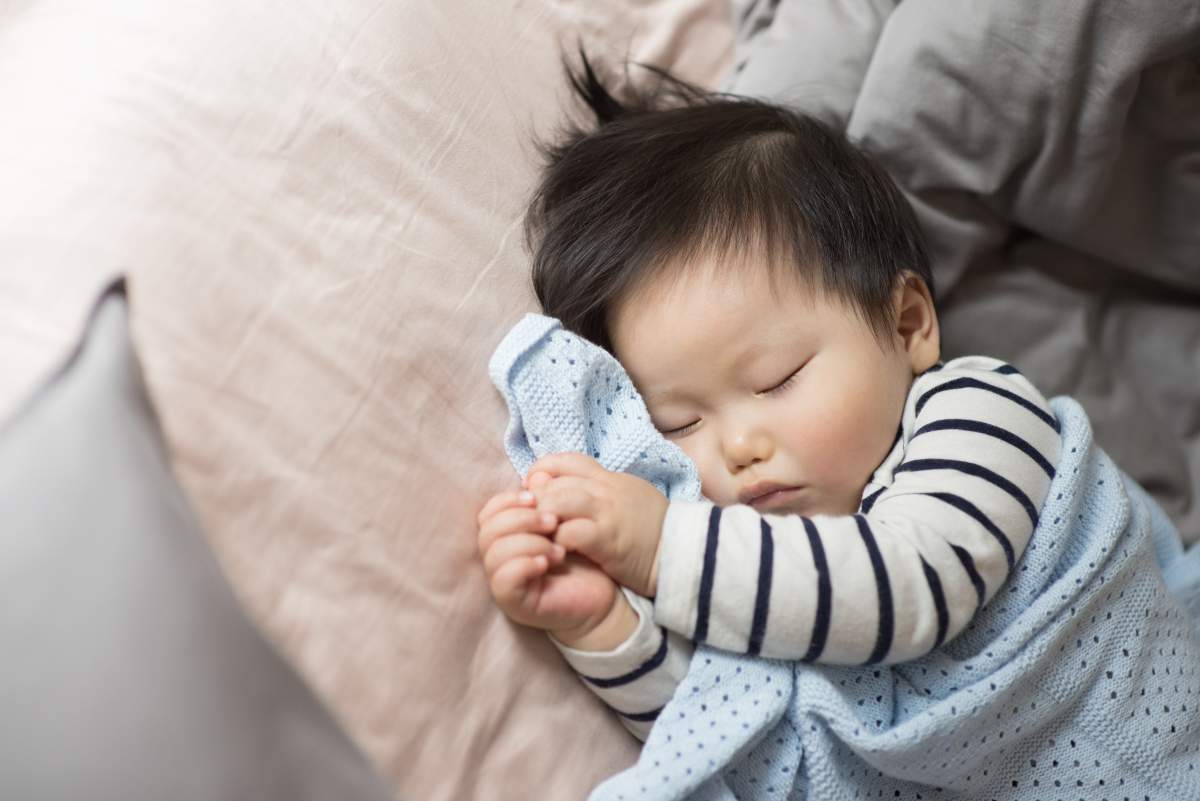A new study suggests infants may sleep longer when they are sleeping alone.

According to a recent study published in Pediatrics, babies who slept alone at four months were sleeping one hour and 40 minutes longer at nine months of age, compared to babies who still shared a room with their parents. This research actually contradicts recommendations by the American Academy of Paediatrics (AAP) and The Canadian Paediatric Society (CPS).
The AAP recommends parents keep babies in the same room with them (in a crib) for the first 12 months to prevent sudden infant death syndrome (SIDS); CPS also recommends that infants sleep in a crib, cradle or bassinet that meets current Canadian regulations for the first year.
And while 90 per cent of SIDS cases happen in the first six months, study author Dr. Ian Paul says more research needs to be done in the six- to 12-month period.
READ MORE: How one Canadian woman changed the parenting game with this baby invention
“Many paediatricians and sleep experts question the room-sharing recommendation until one year because infants begin to experience separation anxiety in the second half of the first year, making it problematic to change sleep locations at that stage,” he said in a statement. “Waiting too long can have negative effects on sleep quality for both parents and infants, in both the short and long term.”
Does this time frame matter?

Get weekly health news
To conduct the research, Paul and his team collected data from another study of 279 women who gave birth at Penn State Health Milton S. Hershey Medical Centre.

Judy Arnall, a certified child development specialist in Calgary and author of Discipline Without Distress, says parents should be following the CPS recommendation of placing babies on their back, in their own bed, and in the parents’ room for the first year.
Dr. Mike Dickinson, president of CPS, says these rules are set, and won’t change, because they’re vital — the rate of SIDS cases in Canada has decreased.
READ MORE: Parents report babies wearing sunscreen become severely burned
Arnall says there is no consistent research that shows infants sleeping alone is the healthier route, either.
“No research shows babies are physically or psychologically more healthy if they sleep alone.”
And often, babies can determine where and how they sleep.
“Parents should follow recommendations but also get to know what works for their unique baby — as all babies are different,” she says. “Some love company and others love to be alone because temperament plays a huge part in how easygoing or needy a baby is.”
Benefits of being in the same room
There are other upsides to sharing a room with your baby. Arnall points out that you are in closer proximity to them, which could make nighttime feedings easier, for example. And familiarity between the child and parent is important, she adds, because it calms down infants who may be experiencing loneliness.
READ MORE: Baby names 2017: 20 of the trendiest names for boys and girls
“Many babies can’t self-soothe and need an adult to calm their stress response. The sooner the better,” she says.
Parents, you need to also think about yourselves
Stephen Roberts, a registered clinical counsellor with the BC Association of Clinical Counsellors, says when it comes to your infant’s sleeping habits, there is no one way of doing things.
“New parents or parents who are anxious may, for their own peace of mind, need to be physically present with their child at all times for the first year or beyond,” he tells Global News. “For other parents, leaving their children alone for short periods may be completely acceptable. Neither is an example of bad parenting. Each simply reflects that parent’s good faith understanding of reasonable actions to ensure their child’s safety.”
And at the end of the day, experts say, you should be trying to get a decent amount of sleep. If you’re sleep deprived, you may want to rethink how your child is sleeping at night.





Comments
Want to discuss? Please read our Commenting Policy first.